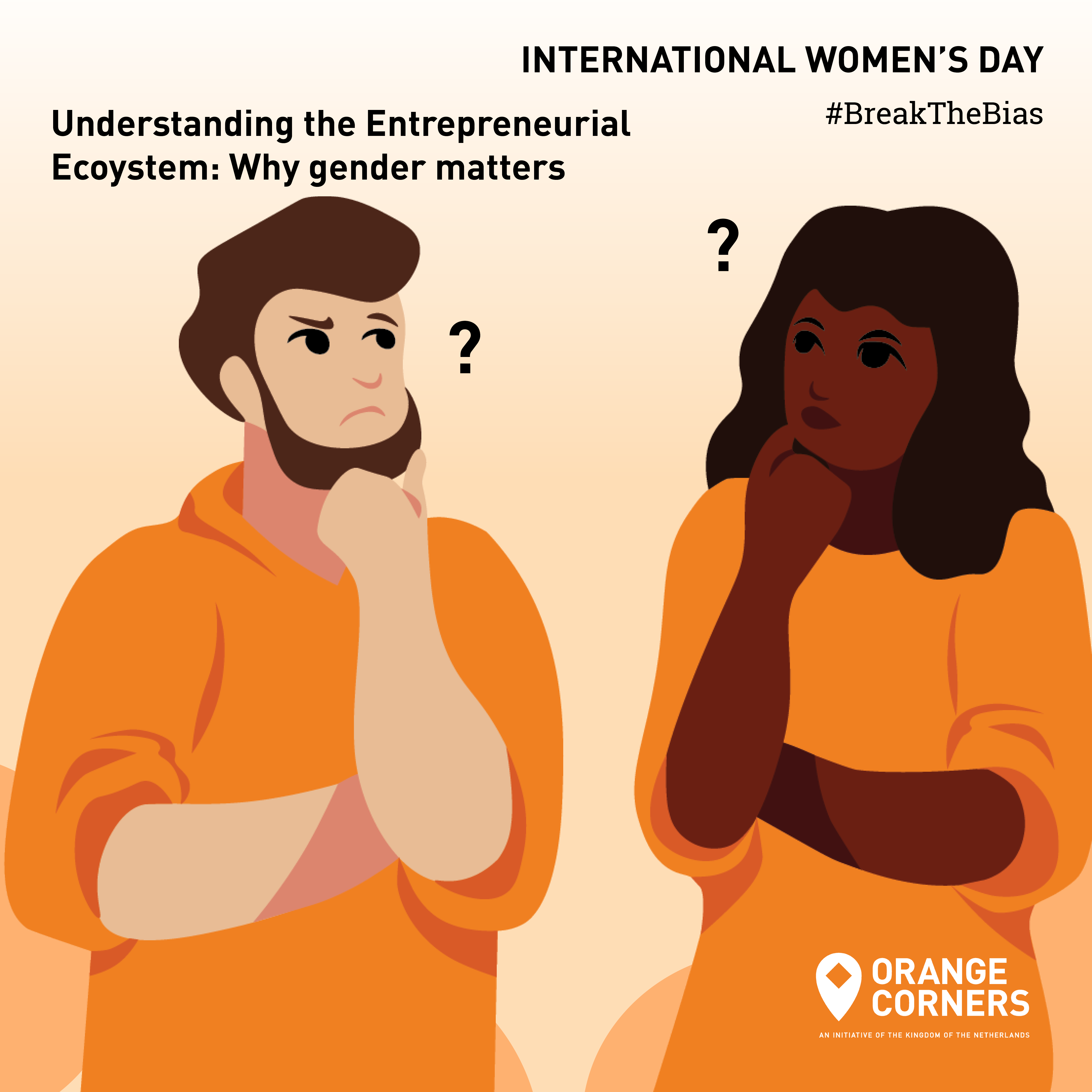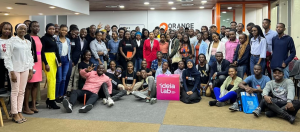For Orange Corners, understanding an entrepreneurial environment or ‘ecosystem’ is incredibly important for the implementation of our programmes. Underlying entrepreneurship ecosystems is often the implicit assumption that all entrepreneurs have equal access to resources, participation, and support, as well as an equal chance of setting up a successful business. However in practice, this is not always the case. Research shows that women and men derive different values and benefits from ecosystems, and hold different roles within them. Hence, gender is a decisive factor in entrepreneurial ecosystems and needs to be taken into account to fully comprehend the challenges and possibilities for entrepreneurship on the ground.
Gendered Entrepreneurship
Entrepreneurship, like most occupations, is highly gendered, which means that it is inherently shaped by culturally defined and socially constructed concepts of femininity or masculinity. Despite the growing number of female entrepreneurs worldwide, masculinity is often still the norm in many entrepreneurial ecosystems and persistent gender bias continues to exist. Of the 43 countries surveyed by the Global Entrepreneurship Monitor Global Women’s Report in 2021, only six showed equal startup rates between women and men. Besides cultural norms that pre-define what sectors are ‘acceptable’ for women to work in, other barriers include the lack of rights to own property or access education, finance and technology. As a result, the ecosystem affects women differently as compared to men, resulting in different ways of ‘doing’ entrepreneurship.
Necessity vs. Opportunity
Looking at the motives for starting a business, female entrepreneurs are more likely to report necessity as a startup motivation, while men are more likely to report starting a business out of opportunity – especially in emerging economies. This can be attributed to different factors, such as the level of education and current occupation when starting a business. Research in the MENA region, for example, shows that the likelihood of becoming an entrepreneur out of opportunity is most likely among people coming from full-time employment and an educational background. The majority of this group consists of men. Women, in contrast, tend to face a higher burden of unpaid care work and lower educational attainment, which makes them more likely to start a business out of necessity (as opposed to opportunity). As a consequence, female-led businesses tend to be smaller and more likely to be informal, which makes them more susceptible to market disruptions and economic shocks. This, in turn, reinforces the persistent usage of negative stereotypes against female entrepreneurs as they seek capital and access to finance to start and scale-up their business.
Services, Sectors & Communities
Not only is there evidence that entrepreneurship ecosystem elements affect men and women differently, but there is also emerging data that illustrates the effect that gender has on entrepreneurship ecosystems. The 10,000 Women Initiative, for example, showed that 90% of female entrepreneurs that participated in a business education program for emerging economies became mentors for other female entrepreneurs in their ecosystems afterwards. According to other research, female entrepreneurs tend to contribute a bigger percentage of their earnings back into their families and communities than men. At the same time, male entrepreneurs are more likely to invest in innovation and growth, and are more concentrated in STEM (science, technology, engineering & mathematics) sectors, while women are over-represented in agriculture, handicrafts and the provision of minor services. Hence, men and women are not only impacted by the ecosystem differently, but in return also impact sectors, services and communities within the ecosystem in different ways.
Gender-lens
As mentioned above, important differences exist between female and male entrepreneurs, as they face specific opportunities and challenges related to their particular life situation and societal roles. Therefore, startup support mechanisms must be considered in the context of the gender-specific situation, since an ecosystem may be beneficial to one entrepreneur but not to another. At Orange Corners, we strive to include gender as an integral theme in all our ‘ecosystem mappings’. This means that data is collected and analyzed separately for women and men in each country. In this way, we aim to identify potential gender gaps within the ecosystem, as well as the constraining and enabling factors that contribute to this. Once these factors are identified, we are better able to understand the role our incubators can play within the regional entrepreneurial ecosystem, and the way they can use their unique position to tackle gender inequalities within the entrepreneurship environment.
Applying a gender lens to entrepreneurial ecosystems not only benefits the impact of our own programmes, but can also stimulate other ecosystem actors to implement gender-inclusive practices. Ultimately, entrepreneurial ecosystems that enable equal opportunities for all genders help to reduce income disparity, increase social equity, stimulate sustainable development and strengthen resilience against both major financial and environmental crises. Therefore, taking gender into account is not only crucial to facilitate opportunities and remove barriers for individual entrepreneurs, but also to develop entrepreneurial ecosystems overall.
Sources
https://link.springer.com/content/pdf/10.1007/s11187-018-9992-9.pdf
https://www.brookings.edu/blog/africa-in-focus/2016/07/25/enablingfemale-entrepreneurs-and-beyond/





